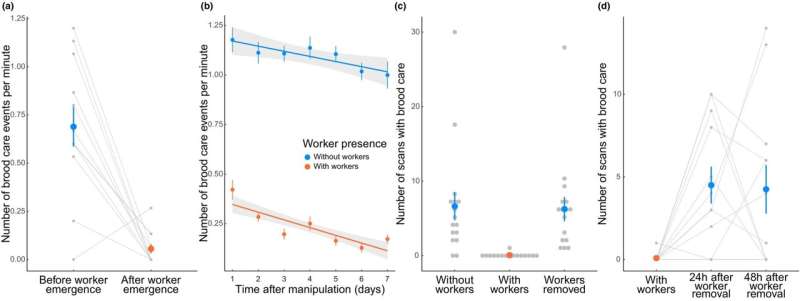This article has been reviewed according to Science X's editorial process and policies. Editors have highlighted the following attributes while ensuring the content's credibility:
fact-checked
peer-reviewed publication
trusted source
proofread
Behavior of ant queens found to be shaped by their social environments

The queens in colonies of social insects, such as ants, bees, and wasps, are considered the veritable embodiment of specialization in the animal kingdom.
The common perception is that the queen's only task is to lay eggs—and that this attribute is an inherent trait, not influenced by external factors. In contrast, recent research undertaken at Johannes Gutenberg University Mainz (JGU) has demonstrated that in certain ant colonies, the social environment can play a crucial role in shaping the behavioral specialization of the queens.
"With regard to the ant species we studied, it is social factors that control whether queens become specialized or not. Our findings challenge the widely accepted notion of social insect queens as inherently specialized egg-laying machines," stated Dr. Romain Libbrecht.
The research was conducted by the Reproduction, Nutrition, and Behavior in Insect Societies group at JGU under the supervision of Dr. Romain Libbrecht, an evolutionary biologist. The corresponding paper has recently been published in Functional Ecology. Dr. Romain Libbrecht currently works at the Centre National de la Recherche Scientifique (CNRS) in the Insect Biology Research Institute of the University of Tours.
Concept of insect societies as superorganisms consisting of specialized individuals
It is generally assumed that social insect colonies consist of queens that monopolize reproduction and sterile workers responsible for all non-reproduction-related tasks, such as the care of the brood (eggs and larvae).
Libbrecht's team now questioned this basic assumption. They focused on ant species where the queens found new colonies alone and without the help of workers. "Interestingly, these founding queens are not yet specialized in terms of their behavior at this stage of their lives," Libbrecht said. "They themselves assume all tasks in the nest, such as brood care, to ensure successful production of the first generation of workers."
In their experiments, Libbrecht's group studied the black garden ant Lasius niger that is native to Germany. They found the social environment to be a core factor in determining the behavioral specialization of founding queens.
"The introduction of workers in the nests of founding queens suppressed the natural predisposition of the queens to look after their brood themselves. And, conversely, when we isolated queens specialized in egg-laying from their workers, they rapidly reverted to the brood care behavior observed in the case of founding queens, even after many years of specialization."
Libbrecht emphasized that the behavior observed during the study challenges the traditional view of social insect queens as being intrinsically specialized in egg production. Instead, the findings demonstrate that the presence of workers not only triggers the egg-laying specialization of queens but also actively maintains it in established colonies. The discovery of such social control of queen specialization may reshape our understanding of the functioning of insect societies and their division of labor.
More information: Vahideh Majidifar et al, Ontogeny of superorganisms: Social control of queen specialization in ants, Functional Ecology (2024). DOI: 10.1111/1365-2435.14536
Journal information: Functional Ecology
Provided by Johannes Gutenberg University Mainz




















